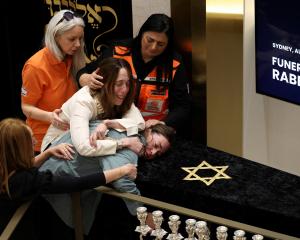
A 27-year-old Syrian man denied asylum in Germany a year ago died when he set off a bomb outside a crowded music festival in Bavaria, the fourth violent attack in Germany in less than a week, a senior Bavarian state official said.
Police said 12 people were wounded in Sunday's attack (local time), including three seriously, in the attack in Ansbach, a small town of 40,000 people southwest of Nuremberg that is also home to a US Army base.
The incident will add to growing public unease surrounding Chancellor Angela Merkel's open-door refugee policy, under which more than a million migrants have entered Germany over the past year, many fleeing wars in Afghanistan, Syria and Iraq.
Bavarian Interior Minister Joachim Herrmann said it was unclear if the man had planned to commit suicide or "take others with him into death", according to news website Nordbayern.de.
Herrmann, whose remarks were confirmed by a ministry spokesman, said the Syrian man arrived in Germany two years ago and had tried to commit suicide twice before.
The man was carrying a backpack filled with explosives and metal parts that would have been sufficient to kill more people, Herrmann said. He said he could not exclude the possibility of an Islamist-inspired attack, but said that would have to be confirmed by an investigation.
One US intelligence official, speaking on condition of anonymity, said investigators would focus on what the bomber was doing before he left Syria, why he was denied asylum, and whether the attempted attack was personal or political.
Herrmann said the man had apparently been denied entry to the Ansbach Open music festival shortly before the explosion, which happened outside a restaurant called Eugens Weinstube.
More than 2000 people were evacuated from the festival after the explosion, police said. A large area around the blast site remained blocked off hours later.
Ansbach resident Thomas Debinski said people panicked when they heard the explosion, especially after the events of the past week.
"Suddenly you heard a loud, a really loud bang, it was like an exploding sound, definitely an explosion," he said. "[People were] definitely panicking."
Debinski said it soon became clear that someone had set off a bomb in a rucksack.
It was the fourth violent incident in Germany in a week, including the killing of nine people by an 18-year-old Iranian-German gunman in Munich on Friday.
Earlier on Sunday, a 21-year-old Syrian refugee was arrested after killing a pregnant woman and wounding two people with a machete in the southwestern city of Reutlingen, near Stuttgart.
"After what just happened in Munich, and today in Reutlingen, what you hear about, it is very disturbing, when you know that such a thing can happen so close to you, in such a small town as Ansbach," Debinski said.
A refugee from Pakistan wielding an axe wounded five people near Wuerzbuerg, also in southern Germany, before he was shot dead by police a week ago.
Police said neither Sunday's machete attack nor Friday's shooting in Munich bore any sign of connections with Islamic State or other militant groups.
Islamic State claimed responsibility for the July 18 axe attack in Wuerzbuerg. The group also claimed responsibility for the July 14 attack France, in which a Tunisian man drove a truck into Bastille Day holiday crowds in the French Riviera city of Nice, killing 84 people.
MANY ATTACKS PRE-EMPTED IN GERMANY
Unlike neighbors France and Belgium, Germany has not suffered a major deadly attack by Islamist militants in recent years, though security officials say they have thwarted a large number of plots. But opposition critics pin the blame for any violent attacks by migrants on Merkel's liberal refugee policy.
A leader of the anti-immigrant Alternative for Germany posted a Twitter message after the Munich shooting that said, "Merkel's unity party: thank you for the terror in Germany and Europe!" The message was later deleted.
The Munich gunman, identified by investigative sources as David Sonboly, who called himself Ali, opened fire near a busy shopping mall, killing nine people and wounding 35 more, before turning his pistol on himself as police approached several hours later.
Bavarian state investigators said materials found in his home showed the gunman had begun plotting the attack a year ago after visiting the site of a 2009 school shooting in southwest Germany in which 15 people were killed.
On Sunday, police arrested a 16-year-old Afghan youth as a possible "tacit accomplice" to the shooting and said he was suspected of having failed to report Sonboly's plans.
Interior Minister Thomas de Maiziere, a member of Merkel's conservative Christian Democrats, pledged to review both gun laws and security policies and seek improvements where needed.
But De Maiziere, a strong advocate of increased video surveillance, said German gun laws were already very strict and it was critical to understand how the attacker had obtained his pistol.
Bavarian state officials said on Sunday that Sonboly bought his reactivated 9mm Glock 17 pistol - the most widely used law enforcement weapon worldwide - on the dark net, a part of the Internet accessible only via special software.
German lawmaker Stephan Mayer, a spokesman for Merkel's conservatives in parliament, told Reuters he supported stricter regulations on the weapons trade and the creation of a European weapons registry modelled on the German national registry.
Burkhard Lischka, a spokesman for the Social Democrats in parliament, told Die Welt newspaper: "We must put a spotlight on the dark net. We have to give our security agencies the staffing and financial resources to stop this illegal trade."
The European Union is considering reforms that would tighten gun controls within the 28-nation bloc and make it easier to trace the origin of weapons bought legally.
The proposed changes, which must still be enacted by EU member states, would also set more stringent rules for deactivating previously fully-functioning guns and making them available for sale.












